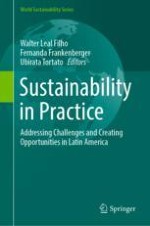Sustainability is now a widely spread concept, and much progress has been achieved since the 1970s, when it started to be widely discussed. At present, many international organizations and scientists are active in implementing sustainable development as a whole and the UN Sustainable Development Goals (SDGs) in particular. Nevertheless, the main research agenda is being led by some countries, providing a good opportunity for other nations and regions which have not yet been so active, to bring their viewpoints to the global discussion. One of these regions is Latin America.
Consistent with the need for more cross-sectorial and cross-cultural interactions among the various stakeholders working in the field of sustainability in Latin America and beyond, this book pursues two main aims:
a) to provide research institutions, universities, NGOs, government agencies, and enterprises from the region with an opportunity to present their works in the field of sustainability and
b) to document and promote ideas and experiences acquired in the execution of sustainability projects, especially successful initiatives and good practice across the Latin America region.
Last but not least, a further aim of the book is to present methodological approaches and experiences deriving from case studies and projects, which aim to show how sustainability may be enhanced in practice.
